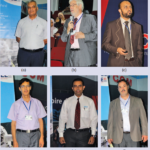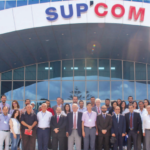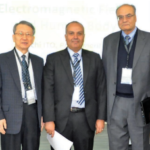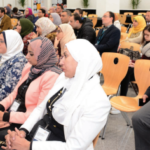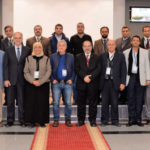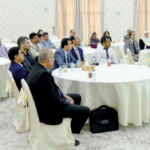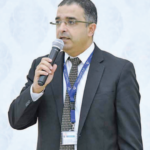IEEE AP-S Workshops
IEEE AP-S Workshop "Future Directions on Antennas and Sensors Research” a Success in Tunisia
Yahia M.M. Antar and Jawad Y. Siddiqui
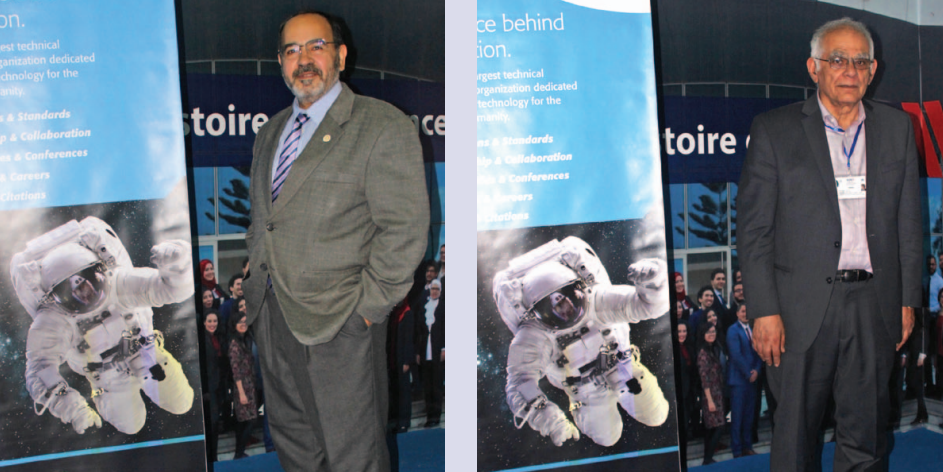
The IEEE Antennas and Propagation Society (AP-S) workshop Future Directions on Antennas and Sensors Research was held on 27–29 September 2017. The workshop was organized by the IEEE Member and Geographic Activities (MGA) in collaboration with the AP-S and IEEE Microwave Theory and Techniques Society Tunisia Chapters and the Tunisian IEEE Section along with the Higher School of Communication of Tunis, Sup’Com. The workshop attracted 80 participants from the region: 32 from the Faculty of Sciences, Tunis; 26 from the Higher School of Communication of Tunis, Sup’Com; ten from the National Engineering School of Tunis, ENIT; and 12 from other institutes, including National Engineering School of Sfax, Ecole Nationale D’Ingenieurs de Gabes, Ecole Nationale D’Ingenieurs de Carthage, Faculte des Sciences de Gabes, Faculte des Sciences de Monastir, National School of Engineering of Sousse, Centre for Research in Microelectronics and Nanotechnology, Tunisie Telecom, and Telecom Networks Engineering. Local hosts Prof. Ali Gharsallah, Prof. Noureddine Boulejfen, and Prof. Lotfi Osman, along with their team of support staff and volunteers, did an excellent job managing the workshop. Participants found the workshop provided a strong impetus to AP-S activities in the Region.
Prof. Ahmed Kishk, IEEE Fellow and former president of the AP-S , and Y.M.M. Antar of the Royal Military College, Canada inaugurated the event. Prof. Kishk delivered the opening address, “Introducing IEEE AP Society and Its Activities,” and messages from MGA Chair Dr. Tapan Sarkar and the Chapter Committee Activities Chair Dr. Ajay Poddar, who could not attend. This was followed by the keynote address by Prof. Antar, “New Directions for Future Antenna Research.” Prof. Jan Machac of the Technical University, Czech Republic, discussed a semiactive 866-MHz radio-frequency identification (RFID) implantable tag fed by 6.78-MHz inductive wireless power transfer frequency-domain chipless RFID transponders. This was followed by a talk on recent advances on multifunctional antennas by Dr. Jawad Y. Siddiqui of the University of Calcutta, India. The first day ended with a presentation by one of the local hosts, Prof. Gharsallah of the University of Tunis El Manar, Tunisia, who delivered a lecture on smart antennas and their applications.
Day two started with a lecture on antenna challenges for fifth-generation applications by Prof. Kishk, which was followed by talks from Prof. Antar and Prof. Machac on dielectric and wireless antennas and frequency-domain chipless RFID
transponders. The postlunch session on the second day included a discussion on flexible, wearable, and disposable wireless sensing systems through additive manufacturing by Prof. Atif Shamim of King Abdullah University of Science and Technology, Saudi Arabia. This was followed by another talk on wireless sensor networks for agricultural applications by Prof. Boulejfen from Centre for Research in Microelectronics and Nanotechnology, Tunisia. The eventful day inspired many young participants to interact with people and discuss research opportunities and directions.
Day three of the workshop started with a presentation by Prof. Antar on space and satellite antennas. The talk that followed on IEEE Special Interest Group on Humanitarian Technology activities by AP-S, delivered by Dr. Siddiqui, piqued the interest of many in attendance. Participants were inclined to strive for technological solutions to address humanitarian needs. Dr. Siddiqui also invited students and researchers to propose ideas where technology could be used for the benefit of humanity. Prof. Lotfi Osman of Sup’Com, the University of Carthage, Tunisia, delivered a lecture on the design of textile antennas for wireless communication applications.
One of the highlights of the workshop was the highly interactive valedictory session. The feedback from the students and researchers was encouraging and interesting. The workshop was very successful, with full attendance for most lectures. It is also noteworthy that more than 30% of the participants who attended the workshop were women. Most of the participants requested that similar workshops and activities be held in the Region.
Thanks are due to the generous local hosts, as well as the local volunteers and enthusiastic students and staff. The event prompted calls for more interaction in the Region, which comprises a sizable, young, knowledgeable, and enthusiastic group of engineers and scientists.
IEEE AP-S Workshop Held in Cairo, Egypt
Yahia M.M. Antar and Hany F. Hammad
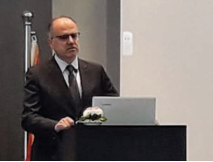
The Member Geographic Activities Committee of the IEEE Antennas and Propagation Society (AP-S) sponsored a three-day workshop, Antenna Challenges in Current and Future Applications, from 29 to 31 January 2019 in Cairo, Egypt. The German University of Cairo (GUC) hosted the workshop, which was organized by Prof. Yahia M.M. Antar, Royal Military College of Canada and Queen’s University, Kingston, Ontario; Prof. Hadia ElHennawy, former dean of engineering, Ain Shams University, Cairo, and chair of the IEEE AP-S Egypt Chapter; and Prof. Hany F. Hammad, GUC. International antenna experts sponsored by the AP-S and European Association on Antennas delivered talks. The presenters included:
■ Prof. Kiochi Ito (AP-S president), Chiba University, Japan
■ Prof. Tapan K. Sarkar, Syracuse University, New York
■ Prof. Ahmed Kishk, Concordia University, Montréal
■ Prof. Stefano Maci, University of Siena, Italy
■ Prof. Levent Sevgi, Okan University, Istanbul, Turkey
■ Prof. Atif Shamim, King Abdulla University of Science and Technology, Thuwal, Saudi Arabia
■ Prof. Jawad Siddiqui, University of Culcutta, India
■ Prof. Karl Warnick, Brigham Young University, Provo, Utah.
The talks encompassed diverse topics, such as the interaction between electromagnetic fields and the human body, smart antennas and ground-penetrating radar, millimeter-wave applications in 5G (gap waveguide), metasurfaces for planar antennas and phased arrays, multiband multifunctional antennas, phased-array receivers, antenna-on-chip and antenna-in-package designs, nano-antennas, multiple input/multiple output systems, and reconfigurable antennas. In addition, there were discussions about AP-S education initiatives.
The inaugural session included a welcome presentation by Prof. Yasser Hegazy, GUC president, followed by Prof. Ito’s introduction to the IEEE AP-S. Prof. Hammad delivered a brief talk about the workshop. The event included presentations from speakers from universities in Egypt, including Ain Shams University, Alexandria University, Cairo University, the American University in Cairo, Electronics Research Institute, Military Technical College, and others, many of which were far from Cairo. The workshop provided an opportunity to showcase Egypt’s research in the domain of antennas and propagation and fostered interaction that opened avenues for further international collaboration in the region. The events of each day were summarized during an open panel discussion, which included speakers and participants, many of whom were students and researchers and who were encouraged to interact with the panelists. The topics ranged from technical to
societal benefits and IEEE policies.
More than 145 academic researchers and engineers from 40-plus institutions attended the workshop, and 40% of them were women who could join the IEEE Women in Engineering initiative. The IEEE Student Chapter at the GUC joined several other clubs at the university to organize and host the events. Students at the 15-year-old university have been able to participate in several IEEE AP-S activities, including reaching the finals of the AP-S Student Design Contest four times (2013, 2015, 2016, and 2019), winning third place in 2013 and first place in 2019. During the workshop events, the visiting speakers visited the Giza pyramids and other attractions in Cairo. There was a significant number of women engineer attendees at the workshop who showed the potential of significant future activities in sync with the IEEE Women in Engineering initiative.
IEEE Fellow Yahia Antar Speaks at Al Ain University of Science and Technology, UAE
Nazih Khaddaj Mallat
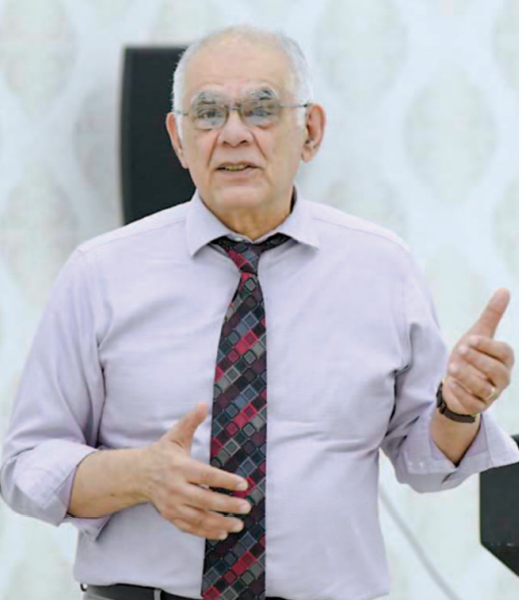
The College of Engineering at Al Ain University of Science and Technology (AAU), in conjunction with the IEEE United Arab Emirates (UAE) Section, IEEE UAE Microwave Theory and Techniques Society (MTT-S)/IEEE Instrumentation and Measurement Society (IM-S) Joint Chapter, and the IEEE AAU Student Branch, organized a technical talk at the Abu Dhabi campus (Mohammed Bin Zayed City).
Dr. Nazih Khaddaj Mallat opened the session; he is dean of the AAU College of Engineering, an IEEE UAE MTT-S/IM-S Joint Chapter chair, and IEEE AAU Student Branch counselor. The lecture, Antennas for Wireless Communications and Other Applications—Recent Advances and Future Trends, was presented by Prof. Yahia Antar, an IEEE Fellow and past IEEE Antennas and Propagation Society Distinguished Lecturer. Dr. Antar is with the Department of Electrical and Computer Engineering at the Royal Military College, Kingston, Ontario, Canada. The event was attended by Dr. Amer Qasem, AAU vice president, and many academic staff, researchers, and students.
Prof. Antar addressed some current and emerging directions of research in antenna systems, fundamentally new approaches for antenna analysis, the near fields and electromagnetic energy around antenna systems, and possible implications for future antenna systems design. He also spoke briefly about the importance and impact of this research on engineering education.
After the presentation, Dr. Khaddaj Mallat thanked Prof. Antar for his informative talk and stated that the College of Engineering will continue to collaborate with the IEEE UAE Section in serving the UAE’s scientific community by organizing various events. At the conclusion of this event, Prof. Antar was honored by Dr. Qasem and Dr. Khaddaj Mallat for his significant efforts and achievements.
